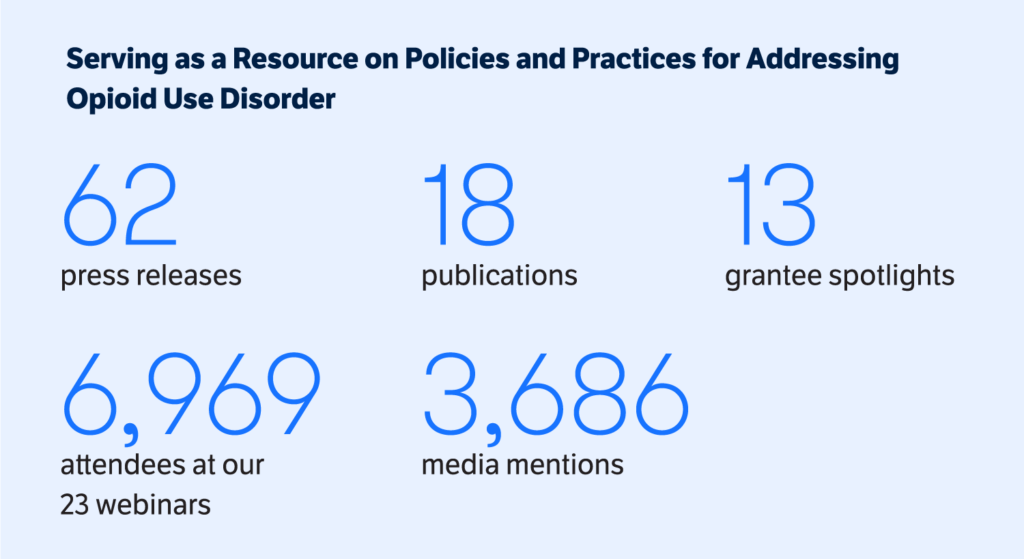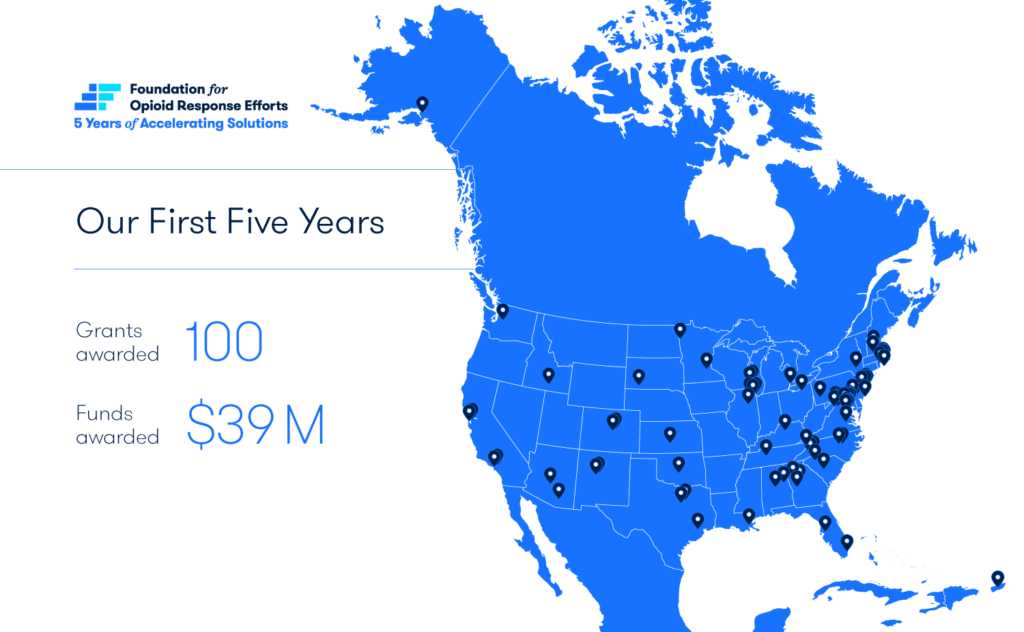News & Updates — President’s Update
President’s Update: Recognizing Our Accomplishments and Charting a Way Forward
November 16, 2023I’m still energized by the conversations and connections that played out at FORE’s five-year anniversary event and all-grantee meeting in Washington, D.C., in September. Over two days, we brought together hundreds of people — board members, advisers, grantees, media, staff, and others, with many more joining online — to recognize the accomplishments of our grantees in fighting the opioid and overdose crisis and set a course for what lies ahead.

We launched our event with the announcement of our newest grants, which deepen our efforts to prevent opioid use and overdose among young people and build strong, resilient families. With the rise of fentanyl, xylazine, and other substances, overdose deaths have risen significantly among U.S. teens and young adults. What’s more, a growing number of children are living in households where a parent is coping with a substance use disorder (SUD). This July, we convened a program advisory meeting to identify gaps in the continuum of supports for children and youth who use drugs and are at risk of overdose.
Sesame Workshop, the nonprofit behind Sesame Street, is receiving $841,000 to expand its library of parental addiction resources: free, bilingual books, videos, and other tools featuring the Muppet, Karli, that are designed to help children affected by parental substance misuse. Meanwhile, the American Academy of Pediatrics is using a $500,000 grant to strengthen the capacity of pediatricians and other pediatric providers to have conversations with young people about substance use, screen for problems, and connect them to treatment.
Over two days, we held panel discussions exploring how FORE grantmaking has expanded access to treatment; spread promising approaches to SUD prevention, harm reduction, and recovery; and engaged people with lived experiences. We also discussed state and federal policy developments and fostered shared learning across our grantee community.
The event made clear that, after five years, we remain committed to:
- Finding innovative ideas. To tackle the opioid crisis, which continues to evolve along with an ever more toxic drug supply, we know we need innovative approaches. FORE has elicited ideas from people across the country, including more than 400 people with lived experience of opioid use disorder (OUD). We’ve reviewed more than 2,500 proposals and launched an Innovation Program to find new solutions to longstanding problems, such as the widespread stigma against people coping with SUDs.In D.C., we heard about the innovative approaches taken by many grantees, including Jonathan Avery, MD, at Weill Cornell Medicine, who is developing a role-playing tool to help medical professionals understand their biases and express greater empathy toward patients with SUDs. We also heard from Jennifer Viveiros, PhD, Mary McCurry, PhD, and Monika Schuler, PhD, of the University of Massachusetts Dartmouth who are developing simulations to train nursing students about how negative attitudes toward patients with OUD can contribute to poor care experiences.
- Promoting what works. Our publications, tools, webinars, and other resources are filling a crucial need for information on what’s working to help people find treatment and recover. The same week FORE marked its fifth anniversary, an article I wrote with grantee Maridee Shogren, DNP, CNM, a certified nurse midwife and dean of the College of Nursing and Professional Disciplines at the University of North Dakota, and Ken Shatzkes, PhD, FORE program director, was published in the Maternal and Child Health Journal. In the article, “Reducing Fear to Help Build Healthy Families: Investing in Non-Punitive Approaches to Helping People with Substance Use Disorder,” we share lessons from Shogren and other grantees’ work showing that training perinatal providers on how to provide OUD treatment and clarifying child welfare reporting rules can encourage more pregnant and parenting people with SUDs to seek help.

- Building bridges. The events in D.C. made clear that FORE is building a community of people dedicated to ending the opioid crisis. To do so, we’re focused on breaking down siloes between addiction medicine professionals and other health care providers. We heard from grantee Kathryn Hawk, MD, MS, who is working through the Emergency Medicine Foundation to provide coaching and support to clinicians at 70 emergency departments to enhance their capacity to dispense naloxone and initiate buprenorphine to patients with OUD. We’re also partnering with people beyond health care, including those working in the criminal justice sector, schools, and community recovery organizations.
- Informing policy. In D.C., we heard from Yngvild K. Olsen, MD, MPH, director of the Center for Substance Abuse Treatment at the Substance Abuse and Mental Health Services Administration (SAMHSA). Olsen spoke about federal policy developments, including the new Medication Access and Training Expansion (MATE) Act, which requires those applying for or renewing their Drug Enforcement Agency licenses to undergo eight hours of training on OUD, other SUDs, and the appropriate treatment of pain. Capt. Christopher Jones, PharmD, DrPH, MPH, director of SAMHSA’s Center for Substance Abuse Prevention, weighed in on the grantee panel on community-driven responses, while Rebecca Haffajee, JD, PhD, MPH, principal deputy assistant secretary for planning and evaluation at the Department of Health and Human Services, reported on that department’s Overdose Prevention Strategy.We also heard from grantees who are working with policymakers to find bipartisan solutions to the crisis, helping states develop coordinated opioid responses, and supporting states using Medicaid waivers to connect people in prison with SUD treatment.

- Responding to the field. When we heard from community-based organizations about their need for operational support, we launched a program to support them. Thus far, we’ve enabled 22 organizations to hire staff, adopt new technology, or otherwise expand their efforts to provide prevention, harm reduction, treatment, and recovery services. In D.C., we heard from new grantee Matthew Burgan, a community paramedic at Maryland’s Frederick County Division of Fire and Rescue Services. In 2021, the organization launched the Community Outreach and Support Team (COAST) program, sending specially trained community paramedics and peer recovery specialists to respond to 9-1-1 calls involving substance use. The teams can initiate buprenorphine and connect people to longer-term treatment. FORE funds are supporting EMS training to extend these efforts and helping pay for travel vouchers so people with SUDs can get to treatment.
In the years to come, we will continue to broaden and diversify the community of people working to end the opioid crisis, learn from people with firsthand experience, and support evidence-based approaches to saving lives and reducing risks for the next generation.
